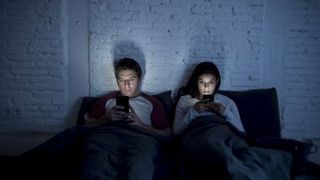Why Haven’t You Turned On Your Phone’s Blue Light Filter Yet?
Blocking the blue light that seeps from screens can seriously improve your sleep

When you wake up in the morning, what would you give for an extra 25 minutes in bed? Well, that extra snoozing time is just waiting for you to take it – with one extremely simple life hack.
A new study serves as a timely reminder that the blue light emitted from phones and electronic screens hinders shut-eye, and that switching on (or downloading) filters could lead to real improvements in your rest by limiting exposure to this light.
All light can interfere with your body clock but blue light in particular suppresses the production of melatonin, which drives circadian rhythms and tells your body it’s time to sleep. Your melatonin levels normally rise through the evening and stay high throughout the night.
New research undertaken at the University of Houston College of Optometry asked 22 participants aged between 17 and 42 to wear short wavelength-blocking glasses for three hours before their bedtime for three weeks. During that time they maintained their normal digital routine.
The blue-light blocking glasses had a dramatic effect on the subjects’ night-time melatonin levels, which rose by 58%. The participants also wore activity and sleep trackers, and reported that they fell asleep faster and slept better – and their average sleep time went up by 24 minutes a night.
According to optometrist Dr Lisa Ostrin, who led the study, you don’t have to stop spending any time at all on your digital devices in the evening (although picking up a book instead of watching Netflix will solve the problem immediately), but turning on screen filters or wearing anti-reflective glasses can help reduce their negative impact on your sleep.
“By using blue blocking glasses we are decreasing input to the photoreceptors, so we can improve sleep and still continue to use our devices. That’s nice, because we can still be productive at night," said Ostrin.
Get the Coach Newsletter
Sign up for workout ideas, training advice, reviews of the latest gear and more.
Many smartphones and tablets now have a night setting available that reduces the amount of blue light emitted. The free programme f.lux does the same thing for laptops, so you can carry on working into the night (if you must).
See related

Nick Harris-Fry is a journalist who has been covering health and fitness since 2015. Nick is an avid runner, covering 70-110km a week, which gives him ample opportunity to test a wide range of running shoes and running gear. He is also the chief tester for fitness trackers and running watches, treadmills and exercise bikes, and workout headphones.
